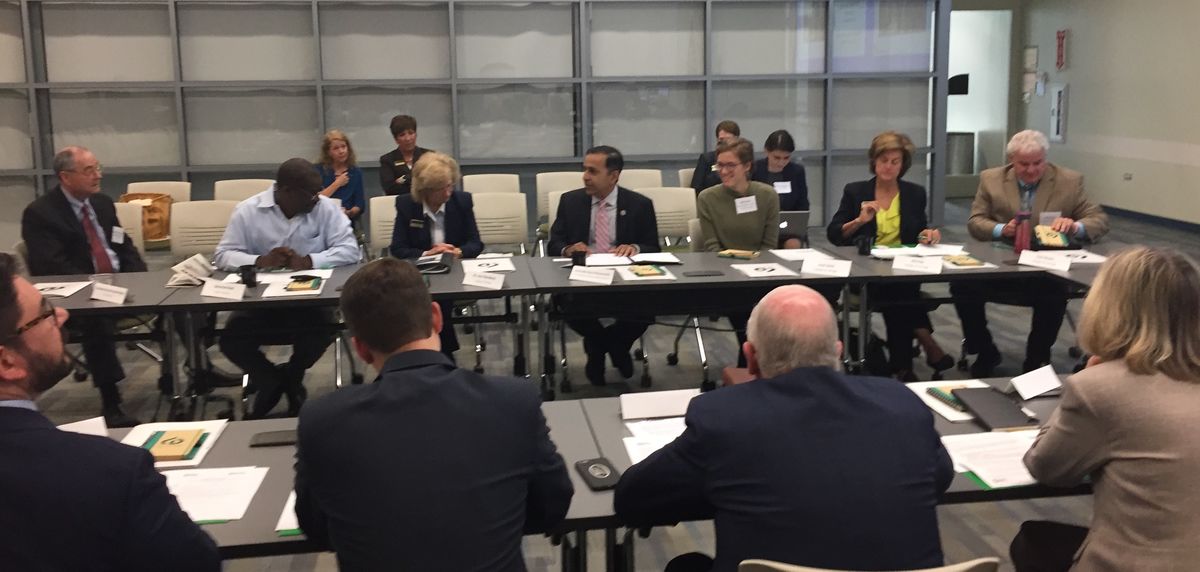Postsecondary Approaches to Meeting First-Priority Needs
Illinois roundtable discussion focuses on workforce-development challenges
Related
The timing couldn’t have been much better for a discussion of workforce preparation and the role of post-secondary education: Only one week removed from the bipartisan reauthorization of federal support for Career & Technical Education (CTE) programs, nationwide.
Plus, one of the CTE law’s chief sponsors – U.S. Rep. Raja Krishnamoorthi (D, IL-08) – was a featured guest at this “roundtable” event, held by ReadyNation and Mission: Readiness at the College of DuPage in Glen Ellyn, Illinois.

Modernizing the country’s approach to CTE could “set off a revolution” in workforce development, the Congressman said. The new law not only boosts program support by up to $1.3 billion a year, it also shifts spending authority closer to local CTE efforts and ensures greater involvement by local industry leaders.
Bolstering job skills is “one topic where people can come together” regardless of political-party affiliation, agreed Illinois state Rep. David Olsen (R-Downers Grove) another roundtable participant who once served as vice chairman of the College of DuPage’s board of directors.
Also participating in the Aug. 7 roundtable were business executives, retired military leaders, educators and a college student. The event included the release of a brief from ReadyNation and Mission: Readiness on post-secondary education, and the day’s discussion began with talk of workforce-development needs.
Employees’ technical skills are critical, several business leaders said – but so, too, are social-emotional skills such as good communication and teamwork.
Give me someone who will show up 40 hours a week, someone who is trainable – who can learn to learn.
Mr. David Sabathne, longtime ReadyNation member, President & CEO of the Western DuPage Chamber of Commerce
“Everybody wants a ready-made employee, one who’s 90 percent productive up-front,” said Sherman Neal, President of Aspire Ventures LLC in Plainfield, a new member of ReadyNation. Because training is so expensive for employers, he added, they appreciate the pre-employment efforts of such schools as College of DuPage (COD) and William Rainey Harper College in Palatine, which also participated.
Educators outlined several of their schools’ programs aimed at strengthening workforce skills, such as COD’s Project Hire-Ed. It follows an apprenticeship-style model, and relies heavily on conversations with local employers to help shape curricula with a stronger focus on in-demand skills.
The roundtable conversation also extended to ways of bridging the barriers that prevent many students from accessing the post-secondary training needed for the careers they seek. For instance, Harper College’s Promise Scholarship Program offers local students up to two years of tuition if they can maintain good grades and school attendance, among other criteria.
Two Mission: Readiness members also took part in the event: U.S. Navy Vice Admiral Ann Rondeau (retired), who now is President of COD, and U.S. Army Lt. Gen. Randall Rigby (retired). They noted the country’s military relies on finding well-skilled young people to serve, just as private businesses do. Some might benefit from post-secondary training before pursuing military service; others might seek higher education after their time in uniform.
Military recruitment struggles already are growing more pronounced, Gen. Rigby said. The Army recently announced it was falling about 3,500 recruits shy of its goal for enlisting new troops in 2018.
Read More About
States